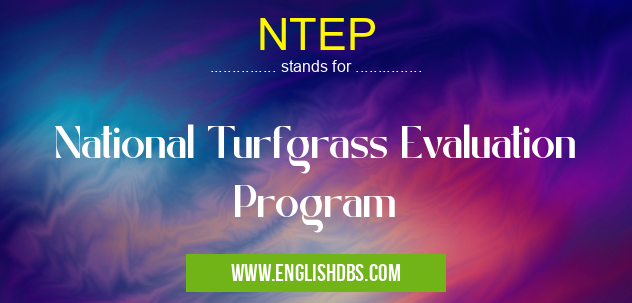What does NTEP mean in UNCLASSIFIED
The primary purpose of NTEP is to provide turfgrass breeders, researchers, and industry professionals with reliable and standardized data on the performance of different turfgrass varieties. This information helps them make informed decisions about which varieties are best suited for specific climates, soil conditions, and use patterns.

NTEP meaning in Unclassified in Miscellaneous
NTEP mostly used in an acronym Unclassified in Category Miscellaneous that means National Turfgrass Evaluation Program
Shorthand: NTEP,
Full Form: National Turfgrass Evaluation Program
For more information of "National Turfgrass Evaluation Program", see the section below.
Purpose of NTEP
NTEP Evaluation Process
NTEP conducts its evaluations at multiple research sites across the United States. Each site represents a different climatic zone and soil type. Turfgrass varieties are planted in replicated field trials and evaluated for various characteristics, including:
- Establishment: How quickly and uniformly the grass establishes from seed or sod.
- Density: The thickness and coverage of the turf.
- Color: The shade and uniformity of the grass blades.
- Texture: The smoothness or coarseness of the grass leaves.
- Disease resistance: The ability of the grass to resist common turfgrass diseases.
- Pest resistance: The resistance of the grass to insects and other pests.
- Drought tolerance: The ability of the grass to survive periods of limited water availability.
- Heat tolerance: The ability of the grass to tolerate high temperatures.
- Cold tolerance: The ability of the grass to survive in cold climates.
Benefits of NTEP
NTEP provides valuable information to the turfgrass industry, including:
- Identification of superior turfgrass varieties:
- Development of new turfgrass cultivars:
- Improved management practices:
- Reduced environmental impact:
Essential Questions and Answers on National Turfgrass Evaluation Program in "MISCELLANEOUS»UNFILED"
What is the National Turfgrass Evaluation Program (NTEP)?
NTEP is a cooperative research program between universities and the turfgrass industry that evaluates the performance of new turfgrass varieties. The program is funded by the USDA and is conducted by the National Turfgrass Evaluation Committee (NTEC). NTEP provides unbiased information on the performance of new turfgrass varieties to help turfgrass professionals make informed decisions about which varieties to use.
How does NTEP evaluate turfgrass varieties?
NTEP evaluates turfgrass varieties for a variety of traits, including drought tolerance, heat tolerance, cold tolerance, disease resistance, insect resistance, and wear tolerance. The varieties are evaluated at multiple locations across the United States, and the data is used to develop a national performance rating for each variety.
What is the benefit of using NTEP-rated turfgrass varieties?
Using NTEP-rated turfgrass varieties can provide a number of benefits, including:
- Improved turfgrass performance
- Reduced maintenance costs
- Increased water conservation
- Reduced pesticide use
- Improved environmental sustainability
Final Words: NTEP is a comprehensive program that provides valuable information on the performance of turfgrass varieties. This information helps breeders, researchers, and industry professionals make informed decisions about turfgrass selection and management, leading to healthier, more sustainable, and visually appealing turfgrass areas.
